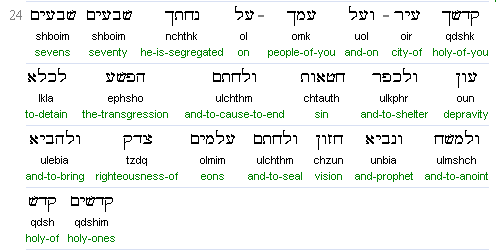|
|
|
Daniel 9:24
To this end, did the Messiah make reconciliation for iniquity? Yes He did at the Cross and His Crucifixion. However, if we STOP Daniel’s prophetic CLOCK at the completion of the 69th Week BEFORE the Crucifixion of the Messiah then how could the Messiah have made reconciliation (atonement) for iniquity during Daniel’s 70 Weeks? This event would have happened OFF the CLOCK which is NOT permissible according to Dan. 9:24. Here is why there can be NO complete 7 years remaining of Daniel’s 70th Week: There are 2 major events of the 6 events of Dan. 9:24 which were BOTH fulfilled at the Cross by the Messiah that must be completed within the ‘timeframe’ of the 70 Weeks (70th Week).
1.)
to make and end of Sin (Sin-Offering) Thus, the following Scripture ties these two above events to the Cross AFTER (following) the completion of the 69th Week (483rd year).
Daniel 9:26
The Cross CANNOT be approximated or even interpreted to HAVE BEEN completed AFTER the Exact End of the 69th Week BECAUSE the grammar of the above Passage is ALL in the future tense – an future action that was to occur beyond (AFTER) the 483rd year (see supporting Passages below). The translated English language itself makes it clear that the above Passage was to be a future fulfilled event. Meanwhile, the word ‘Karath’ used in Dan. 9:26 (ikrth – Strong’s 3772) in this EXACT SAME tense is used some 11 other times throughout the OT and in each and every case it CONSISTENTLY refers to a ‘FUTURE’ event (shall be – Hebrew Imperfect). Gen. 9:11 - Imperfect, Lev. 17:14 - Imperfect, Josh. 9:23 - Imperfect, Ruth 4:10 - Imperfect, 1 Kings 2:4 – Imperfect, 1 Kings 8:25 - Imperfect, Isa. 48:19 - Imperfect, Jer. 33:18 - Imperfect, Hos. 8:4 - Imperfect, Oba. 1:9 - Imperfect, and Zech. 14:2 - Imperfect. Going forward, what is the relationship in the Passages below with the Messiah and the Cross? The KJV translates the Hebrew base word chatta ‘ah (sin) used in Daniel 9:24 as a ‘Plural’ but in the actual Hebrew Text it is used as a ‘Singular in this particular Passage.
John
1:29
Daniel 9:24
When we analyze the Hebrew word chatta ‘ah used in Dan. 9:24 and translated as ‘Sin’ (see the NASB and the NIV Bible translations below) we find according to Brown-Driver-Briggs Hebrew Lexicon that this word is used as a ‘Singular’ in this Passage.
Daniel
9:24 (New International Version)
Daniel
9:24 (New American Standard Bible) Meanwhile, this same word chatta ‘ah as used here has two COMPLETELY acceptable definitions according to Brown-Driver-Briggs Hebrew Lexicon and they are as follows:
1. Sin This same word chatta ‘ah in its same tense is used as ‘Sin-Offering’ in 2 Kings 12:16 and is translated as such by the J.P. Green Interlinear Bible, NIV, and NASB – although the NIV in this Passage translates the word in the Plural while the KJV uses the Singular and drops the word ‘offering’. Nonetheless, it is in the Singular and is defined here as ‘Sin-Offering’. Moreover, in its other tenses this same base Hebrew word is used as ‘Sin-Offering’ more times than I care to count in the OT. What is the point? With either definition the Messiah completed this event as well regarding Dan. 9:24 at the Cross and His Crucifixion during the 70th Week. In summary, it is INESCAPABLE per Scripture that the Messiah was indeed Crucified during the 70th Week. |
|
|
